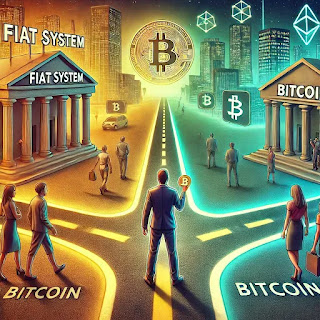The Myth of "Neutral Money": Every Currency Has a Hidden Agenda
We’re taught to think of money like we think of air—omnipresent, invisible, and neutral. But while the air you breathe doesn’t care what you do with your lungs, the money in your wallet cares a lot about how you live, spend, save, and submit. Fiat isn’t just a tool. It’s a message. A value system. A quiet contract, one that was never signed, yet controls everything around you.
You were born into a world where fiat is default, so you never questioned it. But all fiat is designed, crafted to serve the few at the top of the issuance pyramid. There’s nothing neutral about it. There never was.
The Philosophy of Neutrality and the Great Lie Let’s start with a simple truth: neutrality is a myth.
Nothing designed by human hands is ever truly neutral. Language isn’t. Laws aren’t. And money sure as hell isn’t. Every system carries the fingerprints of its creators, whether it’s a legal code, a religion, or a monetary protocol.
The philosopher Michel Foucault said power doesn’t just repress, it produces. It shapes culture, language, even what we believe is possible. Fiat money does exactly that. It produces behavior. It encourages debt. It punishes saving. It rewards short-term consumption over long-term thinking. It doesn’t just transmit value, it warps it.
Neutral money wouldn’t shape behavior. It wouldn’t leak value over time. It wouldn’t be programmable by a handful of unelected bureaucrats. But fiat is all of that and more.
Fiat as a Moral Operating System Every currency has an agenda. But more than that, it has a moral compass, and it imposes that compass on everyone who uses it.
Fiat teaches us that value is temporary. That wealth is meant to be extracted, not cultivated. That your time, your life, can be diluted with the push of a button. When your money dies slowly in a savings account, what does that say about the society that issued it?
Money is a mirror. It reflects the soul of the system behind it. And fiat reflects a system built on surveillance, inflation, obedience, and fragility. It’s not just bad economics. It’s bad philosophy. A currency that loses value is a civilization that doesn’t respect time.
Bitcoin: Axioms Over Authority Now enter Bitcoin. Not as a perfect solution, but as a completely different premise.
Bitcoin isn’t neutral because it tries to be. It’s neutral because it has to be. It’s anchored in fixed rules, not rulers. Its scarcity isn’t enforced by violence but by math. It doesn’t ask for trust, it demands verification. It doesn’t play favorites, bend to borders, or get reprogrammed during economic emergencies. Bitcoin is axiomatic. It starts from unshakable principles, mathematics, energy, time, and lets everything else build from there.
And here's the twist. Bitcoin doesn’t just change how we think about money. It changes how we think about truth. There’s no narrative to twist. No Jerome Powell to whisper sweet nothings. No propaganda machine. Just blocks, ticking on, one after another. Tick tock. Next block. It’s a metronome for a world that’s lost its rhythm.
The Money That Owns You vs. the Money You Own So here’s the philosophical red pill. If your money can be printed at will, surveilled in real time, and programmed to expire, it was never yours to begin with. You were just renting it, playing along in someone else’s game.
Fiat is the illusion of freedom. Bitcoin is the discovery of self-ownership.
Neutral money doesn’t exist. But fair money? Honest money? Permissionless money?
Yeah. That’s real.




Comments
Post a Comment